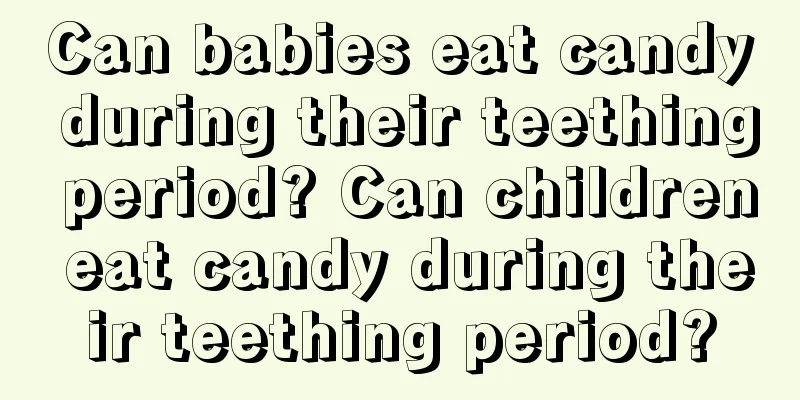Can babies eat candy during their teething period? Can children eat candy during their teething period?

|
The replacement of teeth is an inevitable process for babies to grow up. Today, let’s talk about the replacement of teeth for children. If your baby likes to eat candy, can he eat candy when he is replacing his teeth? Let’s talk about this question in detail. Can babies eat candy when they are replacing their teeth? Can babies eat candy when they are teething?Try not to eat sugar, as it will not be conducive to recovery if the wound has not healed. If children eat too much sugar during the period of tooth replacement, it is easy to cause tooth decay. Tooth decay has a serious impact on children, especially for children who are changing their teeth. The following are the effects of eating sugar during the period of tooth replacement: (1) Facial asymmetry: Since chewing with decayed teeth is painful, children generally avoid chewing with the side with decayed teeth. Once this habit is formed, it will cause facial asymmetry. (2) Maxillofacial developmental deformities: The chewing organ of a person in childhood is the deciduous dentition. Just as the leg muscles need exercise to stimulate their development, the jawbone needs chewing to stimulate its development. If chewing is reduced due to dental caries, the jawbone will not be stimulated and its development will be affected, resulting in different degrees of maxillofacial deformities depending on the severity. (3) Disordered occlusion: Caries formed by deciduous teeth tend to fall out early, but at this time the deciduous teeth have not grown up, so there are more spaces between the teeth. Adjacent teeth will grow into the gaps, thus causing a disordered occlusion. (4) Cause other diseases: As the infection becomes more severe, caries may cause other dental diseases, such as inflammatory lesions of the pulp tissue, infection of the interdental spaces, and poor development of permanent teeth. (5) Affects children’s eating habits and appetite: Children with tooth decay may feel uncomfortable when chewing, which may affect their mood for eating. Over time, it may cause children to have picky eating or anorexia. (6) Affecting correct pronunciation: If caries occurs in the front teeth, it will not only affect the appearance, but also cause speech problems and affect the child's normal speech. Is it good for children to change their teeth too early?Generally, children lose their first tooth between the ages of 6 and 7. Is it good for children to lose their teeth too early? Tooth loss is usually caused by trauma, such as tooth knocks; it may also be caused by certain oral diseases, such as tooth inflammation, caries, etc. Gingivitis is more common among children, but periodontal disease causing tooth bone damage is very rare, so mothers need to know what causes premature loss of deciduous teeth to protect the remaining deciduous teeth. Because it lays a good foundation for the normal growth of permanent teeth. Early diagnosis helps doctors take effective measures to ensure that permanent teeth can erupt and align normally. Therefore, parents must be alert to their children's tooth replacement time and observe their teeth frequently. If they find that their children's deciduous teeth fall out prematurely due to caries, trauma, periodontal disease, etc., they should seek medical attention as soon as possible to avoid damage to the bite function and affect the normal development of permanent teeth and maxillofacial area. About teeth replacementStarting from the first teeth that grow around the age of 6, the second set of teeth are replaced by permanent teeth. The deciduous teeth begin to fall out in sequence at this time, and there are 8 to 12 more permanent teeth than deciduous teeth, that is, the new permanent teeth have 14 to 16 teeth in each row, and the total number of permanent teeth is 28 to 32 (some people never grow wisdom teeth). First of all, parents don’t need to worry about their baby’s newly formed front teeth being uneven or grinding their teeth. After the new teeth grow out, the incisors (i.e. the tips of the teeth) are uneven and need to be gradually smoothed. The baby will involuntarily bite and grind to "align". When the child is about 7 years old, the two upper front teeth grow out. Parents find that the two front teeth of the child are not close to each other and there is a gap in the middle. They are very worried that the two front teeth will separate. In fact, this is the development process after the teeth erupt. After the teeth on both sides grow out, the front teeth will slowly move closer. If the gap is too large, it affects the growth of the teeth on both sides and makes it impossible to close the gap. It is time to go to the hospital to see a dentist for correction. Secondly, when the child’s new front teeth grow out, many parents think that their children have “big buck teeth” and are ugly. There is no need to worry about this. If the permanent teeth are the same size as the deciduous teeth, as the child grows up and the maxillofacial area develops to adulthood, the teeth will become ugly because they are too small. Third, children often have the phenomenon of "double teeth" when they change their teeth. This is because the front teeth usually grow from the deciduous teeth. When the child's deciduous teeth have not fallen out and new teeth grow next to them, double teeth will appear. "Double teeth" are very harmful. Not only do they restrict the normal development of the child's jaws and affect the appearance of the face, but they will also affect the bite of the upper and lower teeth, hinder the chewing ability, and affect eating and digestion. Therefore, when you find that your child has "double teeth", go to the hospital as soon as possible to remove the deciduous teeth to make room for the normal growth of permanent teeth. Normal deciduous teeth promote jaw development, maintain the position of subsequent permanent teeth, and guide the eruption of subsequent permanent teeth. If deciduous teeth are lost prematurely due to trauma or other reasons, parents should ask a doctor to make a retainer as soon as possible to ensure that the gap between them does not narrow, laying a good foundation for the normal growth of permanent teeth. Finally, if the permanent teeth have not come out, it may be that the position of the permanent teeth in the jaw is abnormal, which hinders the growth of the permanent teeth. It may also be related to the child's physical health, nutritional diet, genetics and other factors. The child should be taken to the hospital for a comprehensive examination and symptomatic treatment. Do not use tonics, hormones and other methods to promote tooth growth, otherwise it will bring adverse consequences. After the child starts to change teeth, parents should often observe the growth of the child's new teeth. Some children have bad habits such as sticking out the tongue, sucking fingers, licking teeth, biting pencils, and biting lips when teeth are coming out and changing teeth. Parents should correct them in time, otherwise it will cause tooth deformity and affect the child's ability to bite. |
Recommend
Do I need to avoid certain foods when taking Tianxi Pills? Do I need to avoid certain foods when taking Tianxi Pills?
Many women who take Tianxi Pills are not clear wh...
Can a newborn baby with hiccups be held in an airplane? What is an airplane hold?
Hiccups in newborns are very common, and almost a...
How to gradually reduce the frequency of breastfeeding? Distracting attention is very effective
Many mothers are troubled by weaning. They worry ...
Will a normal birth affect the couple's future life? How to prevent vaginal relaxation after a normal birth
When it comes to the way of giving birth to a bab...
The baby walks like a duck. The baby walks on tiptoe.
Many babies walk like little ducks when they are ...
How do uterine fibroids form? Are they serious?
If your lower abdomen becomes larger for no reaso...
How to check the shelf life of Devondale milk powder? It depends on the expiration date
Devondale milk powder is from Australia. Many peo...
What should parents do if their child has appendicitis?
Appendicitis is the most common emergency in chil...
How to make your baby not afraid of injections
Babies are born with weak immunity and need some ...
Which country does the Chinese toothpaste belong to? Where is the Chinese toothpaste produced?
When I heard the name of Zhonghua Toothpaste, I f...
Children's Bedtime Story: Soothing the Grumpy Princess
Everyone has bad tempers sometimes, but you shoul...
Why do babies get enteritis? What are the causes of enteritis in babies?
Everyone must have heard of many diseases in life...
As spring cold arrives, children's allergies increase. 8 tips to reduce allergy symptoms
Spring is the season when children's allergie...
What to do if you have breast milk diarrhea? Prevention of breast milk diarrhea
It is often said that babies who are breastfed fr...
Can 75% alcohol wipes be ignited? Are 75% alcohol wipes safe?
Alcohol wipes have different alcohol contents, bu...









